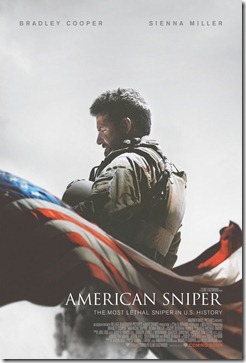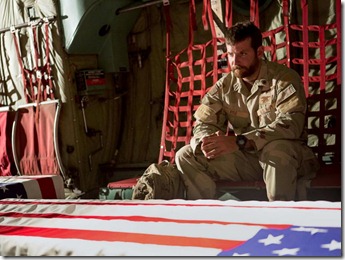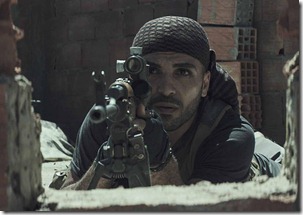 In my opinion, the best war movie of the new millenium is Black Hawk Down, the 2001 Ridley Scott movie that depicted the Battle of Mogadishu in Somalia. It achieved two things that have become standard in the 14 years that have followed. First, it brought the hardship and complexities of modern warfare in a way that hadn’t been seen before. Asymmetric warfare, urban battlefields, complexities influencing battlefield decisions, etc. Secondly, it managed to encapsulate the reason why modern soldiers are so willing to risk it all. From Eric Bana’s character, Hoot: “When I go home, people’ll ask me, “Hey Hoot, why do you do it man? What, you some kinda war junkie?” You know what I’ll say? I won’t say a goddamn word. Why? They won’t understand. They won’t understand why we do it. They won’t understand that it’s about the men next to you, and that’s it. That’s all it is.” Most war movies that have followed have tended to stick to those central tenets.
In my opinion, the best war movie of the new millenium is Black Hawk Down, the 2001 Ridley Scott movie that depicted the Battle of Mogadishu in Somalia. It achieved two things that have become standard in the 14 years that have followed. First, it brought the hardship and complexities of modern warfare in a way that hadn’t been seen before. Asymmetric warfare, urban battlefields, complexities influencing battlefield decisions, etc. Secondly, it managed to encapsulate the reason why modern soldiers are so willing to risk it all. From Eric Bana’s character, Hoot: “When I go home, people’ll ask me, “Hey Hoot, why do you do it man? What, you some kinda war junkie?” You know what I’ll say? I won’t say a goddamn word. Why? They won’t understand. They won’t understand why we do it. They won’t understand that it’s about the men next to you, and that’s it. That’s all it is.” Most war movies that have followed have tended to stick to those central tenets.
And American Sniper, Clint Eastwood’s adaptation of the memoirs of decorated Navy Seal sniper CPO Chris Kyle sticks to those central tenets. The movie, as well as Kyle’s words and actions during and after the Wars in Iraq & Afghanistan, have become the subject of much debate and hotly-inspired discussions. It’s an odd thing because, if I’m honest, the movie doesn’t deserve the vitriol nor the plaudits that are being launched at it. But we’ll get to that in a moment.
Sniper stars Bradley Cooper as Kyle throughout his 30s. He starts out as a rodeo cowboy in Texas, living a life content with broncos, beer and blondes. Not soon after the 1997 terrorist attacks by Al-Qaeda on US embassies in Africa, Kyle chooses to enlist and joins the US Navy with plans of becoming a Navy Seal. The film shows him going through Seal School, making friends, meeting his wife Taya (Sienna Miller) and marrying her, before sending him to fight in the wars in the Middle East. It is there that Kyle distinguishes himself as one of our Armed Forces’ deadliest snipers, recording 160 confirmed enemy kills and earning the nickname of “The Legend” from fellow soldiers who are glad to have him watching over their moves and who thank him for his service when they encounter him back home. Meanwhile, the insurgents whom he faces dub him a different name, “The Devil of Ramadi”.
But as the War in Iraq intensifies and Al-Qaeda-in-Iraq builds a sizeable resistance, Kyle is forced to struggle with living two lives: the one of a soldier, honor-bound to his oaths towards his fellow warriors and that of a family man whose family is growing up without him and from whom a distance is developing. As the toll of tour after tour begins to cost Kyle friends and wears him down, he’s unable to leave it all behind for fear of those who will die if he’s absent. This becomes a strain on his home life; for a wife who’s had to live in fear for her husband and for children who have grown without their father. To whom is duty greater?
 Any discussion of this movie has to start with Cooper and his take on the eponymous American sniper. Cooper’s Kyle is a man who believes. He believes in God. He believes in his country. And he believes in his mission in the Middle East. These beliefs are never questioned or challenged as far as the movie shows. They’re central elements of Kyle’s being and keep him on his path while others struggle and question and doubt. Cooper manages to portray this element properly. The movie may not ask him to be more than what he portrays, but what he does with the role is done well: from man-child cowboy to military operator and devoted husband.
Any discussion of this movie has to start with Cooper and his take on the eponymous American sniper. Cooper’s Kyle is a man who believes. He believes in God. He believes in his country. And he believes in his mission in the Middle East. These beliefs are never questioned or challenged as far as the movie shows. They’re central elements of Kyle’s being and keep him on his path while others struggle and question and doubt. Cooper manages to portray this element properly. The movie may not ask him to be more than what he portrays, but what he does with the role is done well: from man-child cowboy to military operator and devoted husband.
Speaking of which, the levity and the complexity of the movie comes from Cooper’s and Miller’s portrayal as Chris and Taya Kyle. While the movie shorts the courtship process, you do get a sense that these two people did fall in love and cared for one another before Chris is deployed. This, of course, leads to the core conceit of the movie: the strain of the Kyles’ relationship as Chris is split between his duty to his fellow soldiers and his love to his family. A common issue for many modern military families who must struggle with tour after tour taking loved ones away, Chris’ various tours become harder and harder to take for Taya as her children grow up and it gets harder for her to understand Chris’ purpose for returning.
I think this is one missed opportunity by Eastwood. There’s been other properties that have touched upon the strain of military life on families, but none with the cache or the ready-built dynamic that American Sniper provides. The movie has a couple of major sequences – most notably when Kyle and his squad run into an ambush while he’s on the phone with Taya – where this duality is most visible. And as the movie progresses, Miller’s Taya verbalizes her feelings towards Chris, but there’s never a response from Cooper’s Chris in them that lets us into his own thinking. This reduces Taya to an angry shrew and Kyle to an uncaring oaf, which is disappointing.
But if I was to speak of missed opportunities, I think the biggest is to highlight Kyle’s work and life post-war. Kyle creates his own company, which uses retired servicemen and women to train law enforcement officers. He also becomes devoted to working with returning soldiers who are suffering from PTSD and other post-war injuries. Dealing with PTSD has become one of the bigger issues facing modern veterans, their families and the systems that interact with them. From all accounts, it’s one of the causes that Kyle most valued. It is the one that eventually set him on the path of a fellow veteran with his own issues who killed him and his friend. Yet the movie does little service to this aspect of Kyle’s life, which is surprising as it’s one that is criticism-proof.
 Because if anything, what American Sniper focuses on – Kyle’s time in Iraq – has drawn tremendous criticism from some angles. I recognize that this is clearly a specific viewpoint that the movie is portraying. This is Kyle’s experiences in Iraq. I don’t know that it was meant to be an experience that encompassed or encapsulated all aspects of the wars in Iraq and Afghanistan. (I mean, The Hurt Locker, Stop-Loss and The Messenger each discussed aspects of the Global War on Terror for the US military servicemen and women, but they didn’t encapsulate the war either). I am willing to give it the benefit of the doubt that it’s portraying the war as Kyle saw it.
Because if anything, what American Sniper focuses on – Kyle’s time in Iraq – has drawn tremendous criticism from some angles. I recognize that this is clearly a specific viewpoint that the movie is portraying. This is Kyle’s experiences in Iraq. I don’t know that it was meant to be an experience that encompassed or encapsulated all aspects of the wars in Iraq and Afghanistan. (I mean, The Hurt Locker, Stop-Loss and The Messenger each discussed aspects of the Global War on Terror for the US military servicemen and women, but they didn’t encapsulate the war either). I am willing to give it the benefit of the doubt that it’s portraying the war as Kyle saw it.
And what the movie portrays is a place where everyone around Kyle is either a friend or an enemy. They’re either fellow soldiers whom he must protect and lead or they’re enemies whom he must take out and stop before they kill him and his comrades. Even those potentially-good Iraqis that are occasionally met are eventually revealed to be double-dealing “savages,” willing to lie to Kyle and his fellows. The vast majority are targets and threats – like the cartoonish villain, The Butcher – or cannon-fodder. The only exception to this is Mustafa, the Syrian sharpshooter who becomes Kyle’s nemesis in this movie. He rises to the point of being an important part of Kyle’s story: an equal and an opposite and someone for Kyle to battle against in what they do best.
Is this a pretty simplistic way of viewing this conflict? Yes. Absolutely. Nuance is in very short supply here. At worst, the movie skips past reasons for war in Iraq or confounds them with the 9/11 attacks. It portrays nearly all Iraqis as “savages” – I keep using quotes for that word because that’s what is often used – who would all happily sell Kyle or any other American soldier for the bounties on them. That’s if they’re not willing to use bombs or rocket-propelled grenades to blow them up. And that includes by Iraqi women and their children.
But go back to what I wrote a few paragraphs above: this is about Kyle and his experiences there. The movie makes it obvious from the start that it’s going for a “good guy vs. bad guys” ideal here with Kyle as the ultimate good guy. (See the “sheep vs wolves vs sheepdog” sermon at the start). That colors how the movie tells his story. But it also means that it isn’t interested in telling a well-rounded account. This is about how a man fought to defend his fellows and come back alive. At best, it’s a story of how one soldier had an impact in a conflict. How he did his job and became renowned for it, but was after more than just glory. If anything, I don’t recall Kyle ever speaking of the Iraqis in a derogatory manner and the times he’s forced to take the lives of a woman or a child he’s shown to be remorseful at the immediate aftermath. 
The movie does a deft job of skipping over some of the other major controversies that emerged from it. Namely Kyle’s claims of assaulting Jesse Ventura for daring to claim not enough SEALs died in the Middle East and that he and another sniper took position atop the Superdome in the aftermath of Katrina to shoot down looters. In fact, the movie ignores the celebrity status that Kyle gains in the years after his book is published – his appearances in person and on radio and TV, his standing as a bodyguard for Sarah Palin – are not present here. Whether or not they should be is a question I cannot answer. One imagines they were excised because of their controversial (i.e. fictitious) nature. But also because they don’t really work towards the story the movie wants to tell.
To me, the greatest criticism I can levy at American Sniper is towards its director. Eastwood has won Academy Awards and shown himself a very good director. Yet, here, he ends up being very staid; very static. The battle sequences do not carry the kind of energy they should. The emotional beats lie there, unable to beat, because all Eastwood can do is frame simple shots. Compare the night-time battle in Iraq to the night-time battle in Zero Dark Thirty. One is framed with tension and excitement. You feel what it was like in one. The one here could have worked better in a TV setting. It’s like this for just about all the big beats in here. The only one that felt tense was the climax at the end – and that’s thanks to the giant, freaking sandstorm that descends upon the combatants.
So ultimately what do I make of American Sniper? I didn’t think it was as bad as some have said. I also don’t think it’s the best modern war movie or the most important one regarding these current conflicts. At best, it’s one individual story about one talented, but flawed human being. At worst, it’s a movie that glorifies someone who served his country and later ended up aggrandizing himself in the worst way. I think the problem at its core is that we are never let in to who Chris Kyle is beyond the description I gave at the start: he believes in God, in his country and in his mission.
I wonder if there was any more to the man behind “The Legend”. I wonder if we could have understood him better.